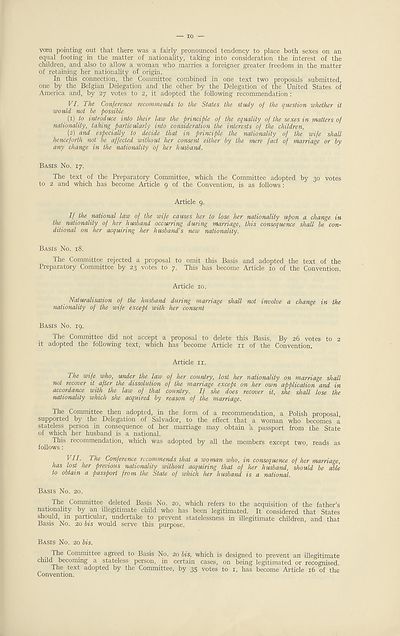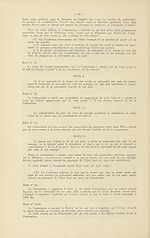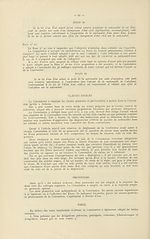Download files
Complete book:
Individual page:
Thumbnail gallery: Grid view | List view

10
voeu pointing out that there was a fairly pronounced tendency to place both sexes on an
equal footing in the matter of nationality, taking into consideration the interest of the
children, and also to allow a woman who marries a foreigner greater freedom in the matter
of retaining her nationality of origin.
In this connection, the Committee combined in one text two proposals submitted,
one by the Belgian Delegation and the other by the Delegation of the United States of
America and, by 27 votes to 2, it adopted the following recommendation :
VI. The Conference recommends to the States the study of the question whether it
would not he possible
(1) to introduce into their law the principle of the equality of the sexes in matters of
nationality, taking particularly into consideration the interests of the children,
(2) and especially to decide that in principle the nationality of the wife shall
henceforth not be affected without her consent either by the mere fact of marriage or by
any change in the nationality of her husband.
Basis No. 17.
The text of the Preparatory Committee, which the Committee adopted by 30 votes
to 2 and which has become Article 9 of the Convention, is as follows :
Article 9.
If the national law of the wife causes her to lose her nationality upon a change in
the nationality of her husband occurring during marriage, this consequence shall be con¬
ditional on her acquiring her husband’s new nationality.
Basis No. 18.
The Committee rejected a proposal to omit this Basis and adopted the text of the
Preparatory Committee by 23 votes to 7. This has become Article 10 of the Convention.
Article 10.
Naturalisation of the husband during marriage shall not involve a change in the
nationality of the wife except with her consent
Basis No. 19.
The Committee did not accept a proposal to delete this Basis. By 26 votes to 2
it adopted the following text, which has become Article n of the Convention.
Article 11.
The wife who, under the law of her country, lost her nationality on marriage shall
not recover it after the dissolution of the marriage except on her own application and in
accordance with the law of that country. If she does recover it, she shall lose the
nationality which she acquired by reason of the marriage.
The Committee then adopted, in the form of a recommendation, a Polish proposal,
supported by the Delegation of Salvador, to the effect that a woman who becomes a
stateless person in consequence of her marriage may obtain a passport from the State
of which her husband is a national.
This recommendation, which was adopted by all the members except two, reads as
follows :
VII. The Conference recommends that a woman who, in consequence of her marriage,
has lost her previous nationality without acquiring that of her husband, should be able
to obtain a passport from the State of which her husband is a national.
Basis No. 20.
The Committee deleted Basis No. 20, which refers to the acquisition of the father’s
nationality by an illegitimate child who has been legitimated. It considered that States
should, in particular, undertake to prevent statelessness in illegitimate children, and that
Basis No. 20 bis would serve this purpose.
Basis No. 20 bis.
The Committee agreed to Basis No. 20 bis, which is designed to prevent an illegitimate
child becoming a stateless person, in certain cases, on being legitimated or recognised.
The text adopted by the Committee, by 35 votes to 1, has become Article 16 of the
Convention.
voeu pointing out that there was a fairly pronounced tendency to place both sexes on an
equal footing in the matter of nationality, taking into consideration the interest of the
children, and also to allow a woman who marries a foreigner greater freedom in the matter
of retaining her nationality of origin.
In this connection, the Committee combined in one text two proposals submitted,
one by the Belgian Delegation and the other by the Delegation of the United States of
America and, by 27 votes to 2, it adopted the following recommendation :
VI. The Conference recommends to the States the study of the question whether it
would not he possible
(1) to introduce into their law the principle of the equality of the sexes in matters of
nationality, taking particularly into consideration the interests of the children,
(2) and especially to decide that in principle the nationality of the wife shall
henceforth not be affected without her consent either by the mere fact of marriage or by
any change in the nationality of her husband.
Basis No. 17.
The text of the Preparatory Committee, which the Committee adopted by 30 votes
to 2 and which has become Article 9 of the Convention, is as follows :
Article 9.
If the national law of the wife causes her to lose her nationality upon a change in
the nationality of her husband occurring during marriage, this consequence shall be con¬
ditional on her acquiring her husband’s new nationality.
Basis No. 18.
The Committee rejected a proposal to omit this Basis and adopted the text of the
Preparatory Committee by 23 votes to 7. This has become Article 10 of the Convention.
Article 10.
Naturalisation of the husband during marriage shall not involve a change in the
nationality of the wife except with her consent
Basis No. 19.
The Committee did not accept a proposal to delete this Basis. By 26 votes to 2
it adopted the following text, which has become Article n of the Convention.
Article 11.
The wife who, under the law of her country, lost her nationality on marriage shall
not recover it after the dissolution of the marriage except on her own application and in
accordance with the law of that country. If she does recover it, she shall lose the
nationality which she acquired by reason of the marriage.
The Committee then adopted, in the form of a recommendation, a Polish proposal,
supported by the Delegation of Salvador, to the effect that a woman who becomes a
stateless person in consequence of her marriage may obtain a passport from the State
of which her husband is a national.
This recommendation, which was adopted by all the members except two, reads as
follows :
VII. The Conference recommends that a woman who, in consequence of her marriage,
has lost her previous nationality without acquiring that of her husband, should be able
to obtain a passport from the State of which her husband is a national.
Basis No. 20.
The Committee deleted Basis No. 20, which refers to the acquisition of the father’s
nationality by an illegitimate child who has been legitimated. It considered that States
should, in particular, undertake to prevent statelessness in illegitimate children, and that
Basis No. 20 bis would serve this purpose.
Basis No. 20 bis.
The Committee agreed to Basis No. 20 bis, which is designed to prevent an illegitimate
child becoming a stateless person, in certain cases, on being legitimated or recognised.
The text adopted by the Committee, by 35 votes to 1, has become Article 16 of the
Convention.
Set display mode to:
![]() Universal Viewer |
Universal Viewer | ![]() Mirador |
Large image | Transcription
Mirador |
Large image | Transcription
Images and transcriptions on this page, including medium image downloads, may be used under the Creative Commons Attribution 4.0 International Licence unless otherwise stated. ![]()
| League of Nations > Legal > Rapport de la Première commission (Nationalité) > (19) |
|---|
| Permanent URL | https://digital.nls.uk/191514909 |
|---|
| Shelfmark | LN.V |
|---|
| Description | Over 1,200 documents from the non-political organs of the League of Nations that dealt with health, disarmament, economic and financial matters for the duration of the League (1919-1945). Also online are statistical bulletins, essential facts, and an overview of the League by the first Secretary General, Sir Eric Drummond. These items are part of the Official Publications collection at the National Library of Scotland. |
|---|---|
| Additional NLS resources: |
|

